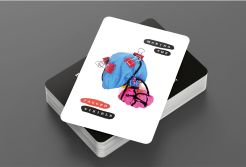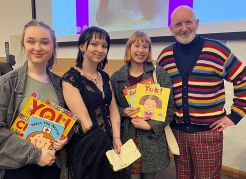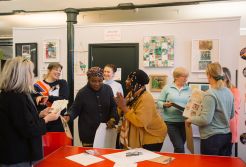14 November 2006
A better way to teach Maths
MMU pioneers new method in Manchester schools
A NEW ‘toolkit’ for teaching mathematics in secondary schools has produced "extremely encouraging" results, according to an interim report from Manchester Metropolitan University (MMU).
Project leaders at MMU’s Institute of Education, one of the UK’s largest trainers of mathematics teachers, found considerable improvements in the performance of low and middle ability pupils in a trial of Realistic Mathematics Education (RME) in 12 secondary schools in Manchester.
The most able pupils also demonstrated significantly better problem-solving abilities, and all RME pupils showed positive signs in their attitude to learning mathematics.
Frank Eade, who heads the three-year trial, said: "Early results are extremely encouraging. Two years into the project, there is strong evidence that RME gives pupils of all abilities a deeper understanding of concepts and a greater scope to apply them."
11-13 year-olds
The RME trial has run for two years with pupils tested at the end of Year 7 and Year 8 and results compared with those of ‘control groups’ of pupils following the national numeracy strategy (NNS).
In Year 7 problem-solving tests, low ability pupils scored on average 37% compared to 16% in NNS, and middle ability 55% compared to 43% in NNS.
In Year 8, 52% of low ability pupils were able to calculate fractions correctly compared to 22% of NNS students. For middle ability pupils the figure was 80% compared to 66% of NNS.
In addition, when asked the question ‘Is the maths you do in school useful for situations outside school?’ 74% of RME pupils said ‘yes’ compared to just 33% of NNS pupils.
Improvements to come
Project organisers claim such differences will become even more pronounced in a year’s time when the pupils are tested again at the end of Year 9.
RME, a pedagogy developed in the Netherlands by the Freudenthal Institute, uses realistic situations as a means of developing mathematical thinking and is described by Frank Eade as "fresh and common-sensical".
"For example, when posing the question ‘Which is larger 3/13 or 3/11?’ many students would start applying random formulae, but we would expect RME pupils to think ‘dividing a cake between 13 people means smaller pieces than dividing it between 11’" he said.
He also said he believed the method would prove popular among teachers, employers and universities.
Deeper understanding
"We are hearing a lot currently about pupils learning by rote but not being able to retain the underlying principles and not being able to apply what they have learned. RME is probably more challenging in the classroom but it appears they are taking more in and learning maths for life not just for passing an exam."
The National Centre for Excellence in the Teaching of Mathematics has responded positively to the findings.
Stephen Hough, Head of Mathematics at Levenhulme High, one of the 12 pilot schools, said: "RME always gives students something to fall back on. It’s like we are now giving pupils a whole toolkit for problem-solving not just a formula which they may easily forget."
Ends
Notes
- Frank Eade recently presented these findings to the British Society for Research in Mathematics Education.
- The three-year pilot of RME has been funded by the Gatsby Charitable Foundation.
- Schools involved in the trial include Levenshulme High School, Cedar Mount High School, Trinity CofE High School (Manchester), Kingsway School (Stockport), and Queen Elizabeth School (Rochdale).
For more information, contact: Frank Eade, Institute of Education, MMU on 0161 247 2296 f.eade@mmu.ac.uk or Mr Stephen Hough, Levenshulme High School, Manchester on 0161 224 4625.
Institute of Education website: www.ioe.mmu.ac.uk


